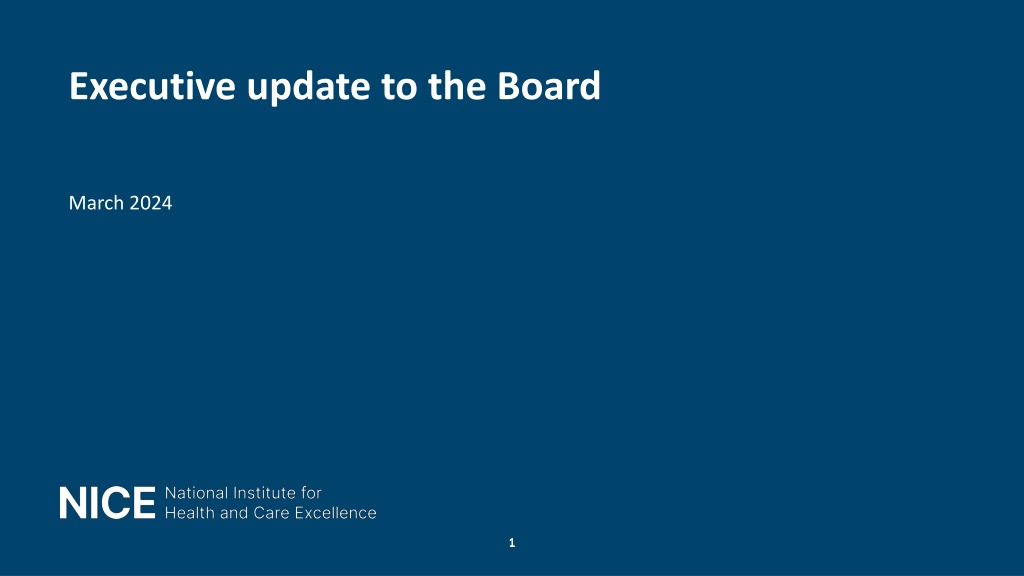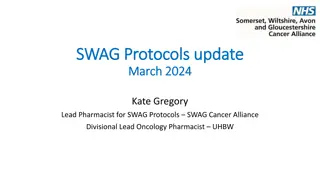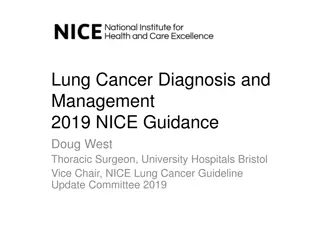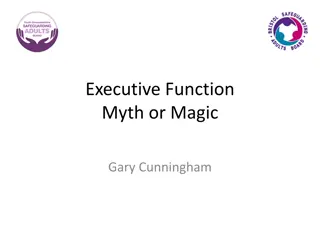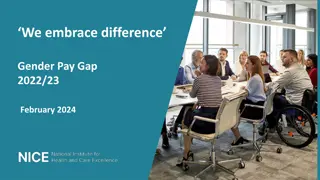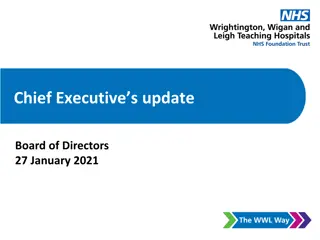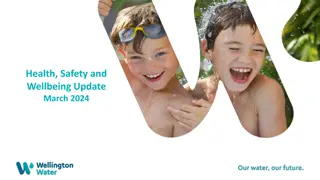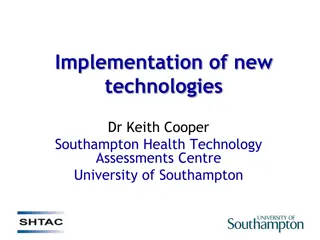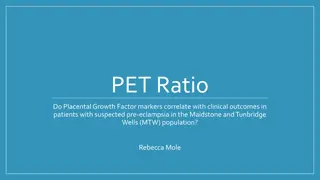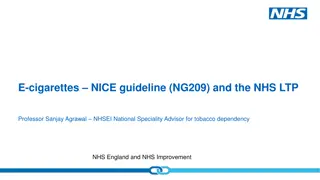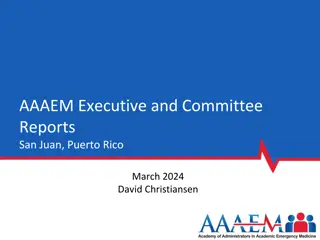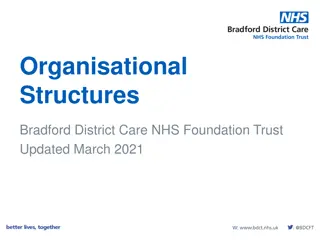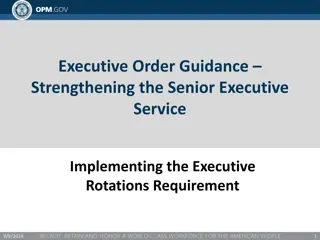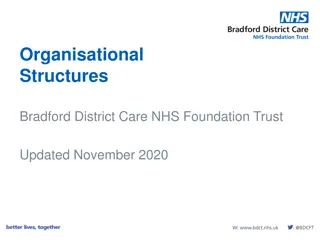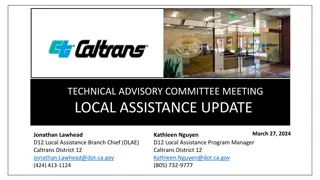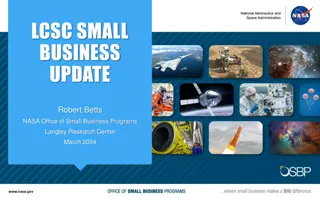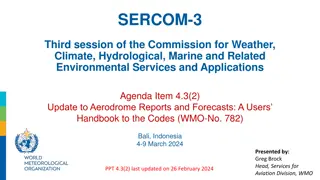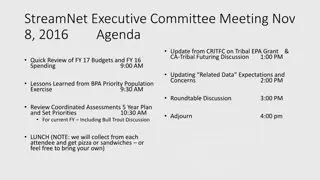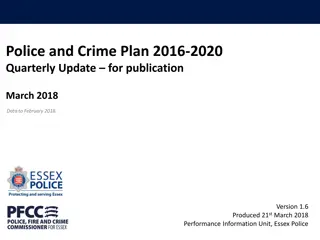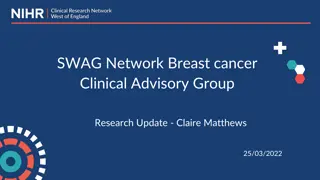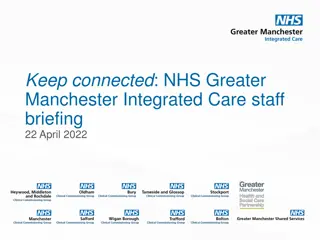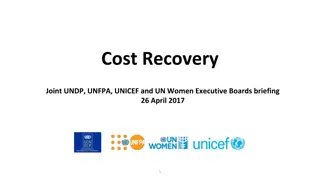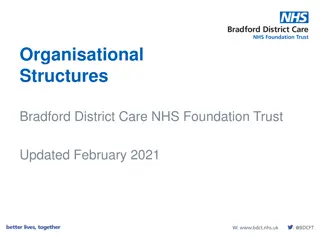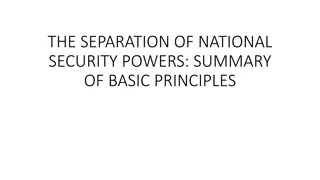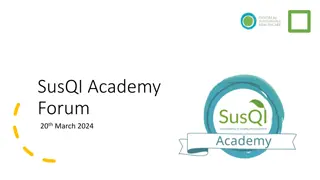NICE Executive Update: March 2024 Highlights
NICE continues to collaborate with system partners to advance government priorities, support the NHS, and streamline patient care delivery. Recent updates include initiatives like the International Recognition Procedure for new medicines, the 10 million funding package for medical technology access, and progress on business plan priorities. Consultations on prioritizing guidance and enhancing community engagement are underway, showcasing NICE's commitment to innovation and excellence in healthcare.
Download Presentation

Please find below an Image/Link to download the presentation.
The content on the website is provided AS IS for your information and personal use only. It may not be sold, licensed, or shared on other websites without obtaining consent from the author. Download presentation by click this link. If you encounter any issues during the download, it is possible that the publisher has removed the file from their server.
E N D
Presentation Transcript
Executive update to the Board March 2024 1 1 1 1 1 1 1 1
Executive Summary NICE continues to work closely with our system partners to deliver government priorities, support the NHS, and get the best care to patients fast while ensuring value for the taxpayer. In recent weeks there has been progress on significant initiatives in which NICE plays a central part: Developers of new medicines can now submit licensing applications through the Medicines and Healthcare products Regulatory Agency s new International Recognition Procedure (IRP). NICE will continue conducting timely appraisals for medicines which receive regulatory approval through the IRP. To do this, we are reviewing development pipelines at an earlier stage and cross-referencing identified medicines with UK PharmaScan. We will also publish information on our website about the impact that different evidence expectations of international regulators at the time of launch have on companies health technology evaluation submissions to NICE. The government has announced a 10 million funding package to boost access to medical technology through the Innovative Devices Access Pathway (IDAP). IDAP is delivered by the Medicines and Healthcare products Regulatory Agency (MHRA), The National Institute for Health and Care Excellence (NICE), NHS England, Health Technology Wales, and Scottish Health Technology Group. NICE, working with our partners, provides tailored, intensive advice on regulatory approval, health tech assessments and access to the NHS. Currently in the pilot stage, the funding will be used to test the new technologies for use on a large scale as quickly as possible. We continue to deliver on our 2023/24 business plan priorities, including consulting on our new approach to prioritising guidance and our interim methods for Late Stage Assessment in HealthTech (slides 3 and 7). We are also consulting on our new strategy for involvement and engagement to improve the way we work alongside people and communities (slides 8-10). Other recent highlights included in this report include guidance highlights which focus on what matters most by recommending the first treatment for severe alopecia areata (slide 4) and tackle sepsis and antibiotic resistance (slide 5), as well as new useful and useable guidance recommending digital technologies providing rehabilitation for people with chronic obstructive pulmonary disease (slide 6). 2 2 2 2 2 2 2 2
1. Focussing on what matters most Consulting on our new approach to prioritising guidance Establishing a new integrated prioritisation board and prioritisation framework to enable NICE to focus on what matters most was a central commitment in our 2023/24 business plan. We are now consulting on this approach ahead of formally implementing our new way of working from May 2024. Our new approach to better focus on what matters most includes: The establishment of an integrated prioritisation board. This will use a common prioritisation framework to decide priorities and coordinate delivery. The development of a common prioritisation framework. This will apply to all topics and products considered by NICE in a consistent and transparent way. The development of our strategic principles for public health, social care and rare diseases to ensure these three areas are not disadvantaged by the new process. The consultation runs until 4th April, following which we will publish our integrated prioritisation manual and formally establish the prioritisation board by the end of May. 3 3 3 3
1. Focussing on what matters most Benefiting thousands of people with severe hair loss by recommending the first medicine for severe alopecia areata Up to 14,000 people could benefit from the first treatment for severe alopecia following a new NICE recommendation for ritlecitinib, a new one-a-day capsule to help treat the condition. The treatment, taken as a daily pill at home, works by reducing the enzymes that cause inflammation and subsequent hair loss at the follicle. Severe alopecia areata can have a significant impact on people s health and quality of life and until now there were no treatments recommended by NICE for use on the NHS. NICE was able to recommend the treatment after an independent appraisal committee initially did not recommend the medicine; this was updated following a public consultation and the company providing additional information and an improved discount to its price. Even with this revision, NICE was able to recommend ritlecitinib just 16 weeks after it was granted a licence by the Medicines and Healthcare products Regulatory Authority (MHRA). 4 4 4 4
1. Focussing on what matters most Tackling sepsis and antibiotic resistance through updated guidance recommending better targeting of antibiotics NICE has updated our guideline to recommend better targeting of antibiotics for suspected sepsis to ensure the right people receive treatment as soon as possible but the medicines are not overused, which can lead to antibiotic resistance. NICE s guidance update provides clarity for health professionals about how to manage this vital and rapidly evolving area of need, ensuring alignment with Academy of Medical Royal Colleges (AoMRC) statement on the initial antimicrobial treatment of sepsis. The updated guideline recommends using the National Early Warning Score (NEWS2) to help ensure antibiotics are targeted to those at the greatest risk of severe sepsis, so they get rapid and effective treatment. It also supports clinicians to make informed, balanced decisions when prescribing antibiotics. 5 5 5 5
2. Creating useful and useable advice Addressing unmet need through new useful and useable recommendations for digital technologies providing rehabilitation programmes for people with chronic obstructive pulmonary disease NICE's medical technologies advisory committee has recommended two digital technologies myCOPD and SPACE for COPD to deliver pulmonary rehabilitation programmes for people with chronic obstructive pulmonary disease (COPD). These digital technologies offer exercise and education sessions to help with people with COPD manage their own condition in a place and time of their choosing. Evidence suggests that 90% of patients who complete a face-to-face pulmonary rehabilitation programme experience increased exercise capacity and improved quality of life. However according to the NHS Long Term Plan, they are currently only offered to 13% of eligible patients, with a focus on those with more severe COPD. These new digital technologies recommended by NICE can help people living in areas without access to an in-person service to receive the care they need. The committee recommended the two digital technologies are used by the NHS whilst further evidence is generated to address evidence gaps. These technologies can be used once they have appropriate regulatory approval and meet the standards within NHS England s Digital Technology Assessment Criteria. 6 6 6 6
2. Creating useful and useable advice Supporting the NHS to use resources as effectively as possible through new methods for Late Stage Assessment in HealthTech We are extending NICE s HealthTech programmes to cover technologies which are already adopted and used in the NHS through Late Stage Assessment (LSA). The Medicines and Healthcare Regulatory Agency (MHRA) has over 3 million different technologies registered for use in the UK, with around 500,000 regularly used in the NHS. NICE s advice for these product classes will help direct purchasing and clinical decisions towards the most clinically and cost-effective products, helping improve patient outcomes and make the best use of public money. These appraisals will also support new, more beneficial technologies to enter the market. Developing an approach for LSA is a key objective in our 2023/24 business plan; we are now consulting on an interim methods and process statement to help deliver this aim and support the approach to late-stage assessment (LSA) launched in October 2023. The consultation closes on 28th March. 7 7 7 7
2. Demonstrable impact by learning from data and implementation Improving the way we work alongside people and communities in our new strategy for involvement and engagement NICE is consulting on our new 3-year strategy for involvement and engagement, 2024 to 2027. This strategy will help deliver our vision to have a best-practice approach to involvement and engagement, to improve the impact of our guidance and ensure the best care for people and communities. Our new strategy continues the impactful engagement we have already undertaken, builds on substantial additional engagement to inform our new approach, and seeks to be more curious about what matters to people and communities. We believe this will deliver more impactful involvement and engagement. We launched the strategy at a webinar attended by 270 people. Our public consultation of the draft strategy ends on 27th March 2024. You can share your thoughts on the strategy at PeopleAndCommunityStrategy@nice.org.uk 8 8 8 8
Five core areas of focus in our new strategy for involvement and engagement 1 2 3 4 5 Impactful involvement and engagement: Tailored approaches: An innovative culture: Productive partnerships: Focus on people first: tailor the way in which people and our communities can engage with NICE. test with, and learn from, new and innovative ways to work alongside people and communities. transform our approach and ways of working with people and communities. embed an ethos of curiosity for involvement and engagement across NICE involve the right people, at the right time, in the right way. 9 9 9 9
Our twelve principles will underpin everything we do 1. Our involvement and engagement is impactful, appropriate and targeted on a case-by-case basis to maximise the impact on our work. 2. We will collaborate effectively with partners to shape and amplify the impact of NICE s work. 3. We will be clear, open and honest about where we can act. 4. We will help everyone feel safe to speak up, to disagree openly, test new approaches and learn from them. 5. Our involvement and engagement activity will be underpinned by a fair and transparent payment policy. 6. We will use the appropriate terminology throughout all our engagement. 7. We will more effectively and consistently listen, use and re-use the insight NICE gets from people and communities to maximise impact and influence. 8. Engagement with people and communities is valued by NICE and has visible commitment from the Board and executive team. 9. Our work will be evidence-informed and aligned with best practice. 10. We will remove barriers that alienate or discourage involvement, especially from traditionally marginalised, excluded or underrepresented groups and build trust. 11. We will create the conditions, culture and processes for staff to embed and value impactful people and community involvement. 12. We will try new ways of working, learn and adapt together, valuing people s diverse skills. 10 10 10 10
